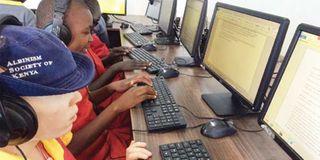GE Kujenga gives visually impaired learners a future

Pupils at St. Lucy’s School for the visually impaired in Meru County, during a computer lesson. PHOTO | COURTESY
What you need to know:
- Through the programme, the visually impaired children have acquired “eyes” into the future, through assisted technology.
- Training combined with technology plays a powerful role in improving educational outcomes and future sustainable employment opportunities for these children.
At St. Lucy’s School for the Visually Impaired in Meru County, Kenya, students are connected to a world far beyond East Africa. The learners are busy working on their assignments using new assisted computer equipment in the newly built computer lab. This is the first time many of the children are having access to information, people and resources via the Internet.
The new computers and the computer lab have been made possible through GE Kujenga, Africa’s flagship citizenship programme that responds directly to the needs of diverse communities across Africa.
Through the programme, the visually impaired children have acquired “eyes” into the future, through assisted technology.
This is not only giving them the skills that they need for daily living, but goes a long way in opening their worldview beyond Africa. It is this exposure that will propel them to break out of their cocoons, think
globally, stay in touch with the world and step out into the future with big dreams.
The project at St. Lucy’s School is part of a skills transfer programme supported by GE’s GE Kujenga programme, which donated Ksh4.5 million ($50,000) towards providing equipment for
the computer lab. This is GE Kujenga’s first donation in Kenya.
The students at St Lucy’s School are among 38 million visually impaired people living in sub-Saharan Africa, of whom 300,000 are children. Being visually impaired covers a wide variety of sight issues from total blindness to lack of usable sight or “low vision.”
Those that are visually impaired face additional challenges in every- day life, as well as in their professional pursuits. However, for these students, their future has definitely changed for the better. Adapted technologies
have given them the tools and resources they need to compete in a modern, global job market.
Research shows that providing a secure and safe environment for children to learn is key to helping them reach their full potential. “Children rise to the expectations set for them. If they are taught that they can achieve, and are given access to the correct equipment, they will fulfil their potential,” said Sister Judith Khavwendesi, the Principal of St Lucy’s School for the Visually Impaired.
Training combined with technology plays a powerful role in improving educational outcomes and future sustainable employment opportunities for these children. This resonates well with the
core values of GE Kujenga, which is committed to helping build Africa’s sustainable future.
While commenting on the project, Jay Ireland, GE Africa’s president and CEO said: “GE is committed to Africa’s sustainable development by making a difference through creating value for societies in ways that will empower the community.”
The project by inABLE, that is supported by GE Kujenga empowers the blind and visually impaired with skills they can use to become employable and make a contribution to society.
Irene Mbari-Kirika, inABLE’s executive director added that;
“Through the laboratories, blind and visually impaired students are able to access online educational resources, communicate with new friends worldwide, type essays, research homework assignments, develop employable skills, use social media, and host blogs.”
inABLE is a non-governmental orgnisation whose mission is to empower the blind and visually impaired students in Africa through assistive computer technology. To date, inABLE has assisted over 500 students and 27 teachers at the Thika School for the Blind – in both primary and secondary school through this programme.
Through this training, they are able to read online, chat, access online services, research and do homework on their own. GE partnered with inABLE in July 2014, and they together identified St. Lucy’s School and saw the potential the students would have if they were better equipped and connected to a world of knowledge and resources.





